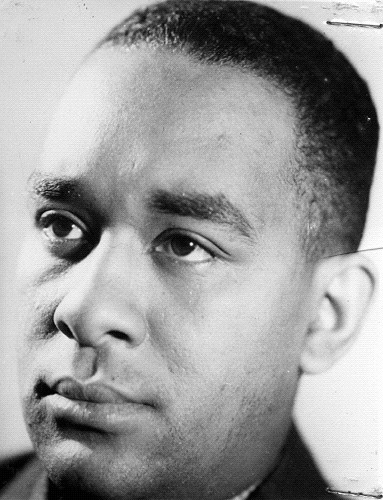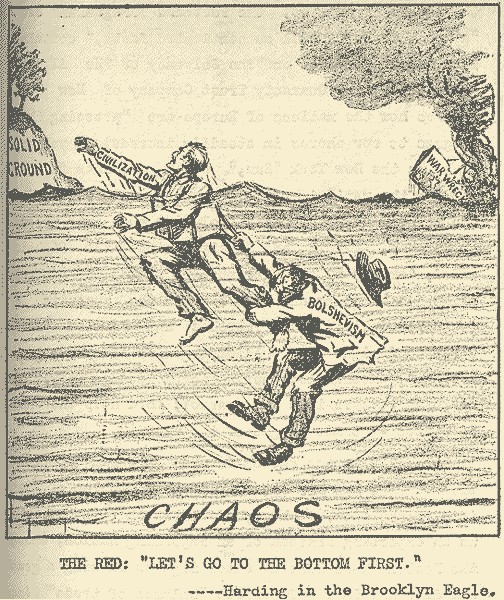 |
Throughout many of the works of literature set in Chicago, alcohol serves as a motif commented on by many seminal Chicago writers. As we will see, there seems to often be a relationship presented between the extent of the difficulties a character must face, and how hard he/ she drinks as a result.
|
Native Son author Richard Wright gives the camera a long face (Citation). |
In Richard Wright's Native Son, alcohol seems to serve as an escape for many of the novel's central characters. Bigger Thomas's girlfriend, Bessie, Bigger notes, seems to be using him mainly to buy her drinks. There's no real emotional basis to their relationship, though there is a symbiosis here-Bigger supplies Bessie with drinks, and Bessie, in turn, has sex with Bigger. Wright, however, is extremely critical of such a reliance (as Bessie's) on a temporary escape. "He hated his mother for that way of hers which was like Bessie's. What his mother had was Bessie's whiskey, and Bessie's whiskey was his mother's religion … [H]e felt what he wanted: to merge himself with others and be a part of this world, to lose himself in it so he could find himself, to be allowed a chance to live like others, even though he was black" (Wright, 240). Wright suggests here that, at base, the real desire of all the Blacks around Bigger is to be integrated in such a way. They, however, do not realize this desire, believing it impossible, and so they have invented artificial solutions which may keep them focused off of the fact of their inequality. Other than Bessie, the only other characters we see drinking are Jan and Mary Dalton (and Bigger with them), both of whom are members of the Communist Party. As we have seen in our page on legal corruption in Chicago literature, the Communists throughout the novel are the targets for ridicule and blame, and so it seems that Wright is perhaps suggesting that this is the problem these two drink to alleviate. |
|
James T. Farrell's Studs Lonigan novels make a good case for Prohibition through their descriptions of the downfalls and deaths of several characters who become alcoholics. However, the works also suggest that the thirst of Chicagoans during the start of the 20th Century and into the Prohibition era was too great for such a law to function effectively. Farrell clearly illustrates the extent to which drinking was part of the lives and culture of Chicagoans, and that, despite the existence of laws banning the consumption of alcoholic beverages, drinking was still a common part of life that could not be abandoned. This was especially true during the Depression, when many people chose to "drown [their] sorrows in drink" (Farrell, 846). Mr. Lonigan, Studs' father, is one such person. During the Depression, his painting business was fails financially, and it is very hard for him to find work. Several painting contracts that he was relying on fall through, and he is unable to make an income sufficient to support his family. He resorts to asking Studs for money, only to find out that he lost most of it in the stock market. Ultimately, Studs' father, after his son dies, goes to a neighborhood bar and releases his sorrow. "Lonigan leaned flabbily over the bar, crying, his facial muscles relaxed, suggesting an ugly approach to old age… Several strangers entered, and a slick fellow, with a cropped moustache, laughed at Lonigan" (Farrell, 850). |
An anti-Communist cartoon (Citation). |
Farrell demands recognition of the health problems such heavy drinking incurs-- due to Stud's excessive drinking, he suffers a heart attack, gets pneumonia, and is put into a coma: he is essentially dying long before he actually reaches his deathbed. All of this news at once is too much for Mr. Lonigan to handle, and his only escape is to hit the bottle.
This novel gives insight as
to how integral a role alcohol played in the lives of young men in Chicago.
Studs and his friends frequent bars, and practically anytime they are
bored, they turn to drinking, which often leads to other questionable
activities. "The boys run the streets, and grow up in poolrooms,
drink and become hooligans. They don't know any better … and they
kill themselves with diseases from whores and this gin they drink"
(Farrell, 425). One year, Studs gets thoroughly
intoxicated on Christmas day and goes to mass drunk. Later, Studs must
get his stomach pumped at the hospital in order to prevent alcohol poisoning.
Drinking was a big part of the lives of boys such as Studs, and at times
it seemed like the only aspect of their lives. Alcohol was used to escape
boredom, sorrow, and any other problems in one's life.
"Slug kept insisting that one beer wouldn't hurt them. They went
down the street to Colisky's saloon and had a beer. They had another.
Before they realized it, they were drinking gin. They got drunk and raised
hell around the corner. They hung around until Slug talked them into going
to a new can house, a small place. They went and had the girlies, and
gypped them out of their pay" (Farrell,
450).
Studs Lonigan is even aware of the success and profits gained by the illegal
production of alcohol. Joe Thomas, one of the guys in Studs' gang, says
to his friend Les, "Here you are, as pale as ever, and still doing
your share to keep Al Capone in business" (Farrell,
498). Later in the novel, he comments on the paradoxical well-being
of the mob while the rest of the city suffers horribly through the Depression.
"There's nothing doing anywhere now, I guess, except for a few bootleggers.
They're just about the only ones who cash in these days" (Farrell,
562). For further discussion, see our webpage on organized crime after
the start of prohibition.
Interestingly, Nelson Algren's The Man with the Golden Arm presents an example of bootlegging after the end of Prohibition. In the book, a World War II veteran, nicknamed Frankie Machine, falls back in love with a neighborhood stripper, Molly Novotny. Unfortunately, both Molly and Frankie are married. Early in the book, Algren slips in an implication that bootlegging is still going on, even decades after the end of Prohibition. "Drunkie John [Molly's husband] had left her for his first and truest love: the bottle without a name" (Algren, 107). As we saw in our Prohibition page, bootlegging continued throughout the years after Prohibition was repealed in order to forego taxes at times when alcohol was taxed very heavily (including during World War II). These drinks were almost always without labels or were poured into previously used bottles.
Many Chicago authors, then,
seem to use alcohol as another means of developing an image of the city
as either (1) the ruthless "city of big shoulders," a meaning
presented most clearly in the poetry of Carl Sandburg, from which alcohol
provides a relief; or (2) corruptive, forcing a moral depravity and vice
upon its passengers and subjects of which alcohol consumption is a part.
Only in Algren do we see a truly sympathetic portrayal of alcohol consumption,
though the aura of the city as inducing criminal activity and extra-legal
behavior persists. The Man with the Golden Arm demands that our humanity
is largely a feature of our failures, of our shortcomings, that these
make us more human than our perfections. In such a context, the use of
alcohol is almost natural, the perfect vehicle for release and simultaneous
self-destruction. Algren inverts the criticism of alcohol so seemingly
inherent in Wright and Farrell, using the escape it provides as a justification
for its use. A friend, Applejack, who Frankie meets in prison begs him
not to take the anti-psychotic drugs they try to give many prisoners.
"I like my little old new-rosis. It's all I got 'n I'm holdin' onto
it hard. My advice to you is hold onto yours: lay off them psychos. Look
out for the major. When guys like you 'n me get square we're dead"
(Algren, 203).


